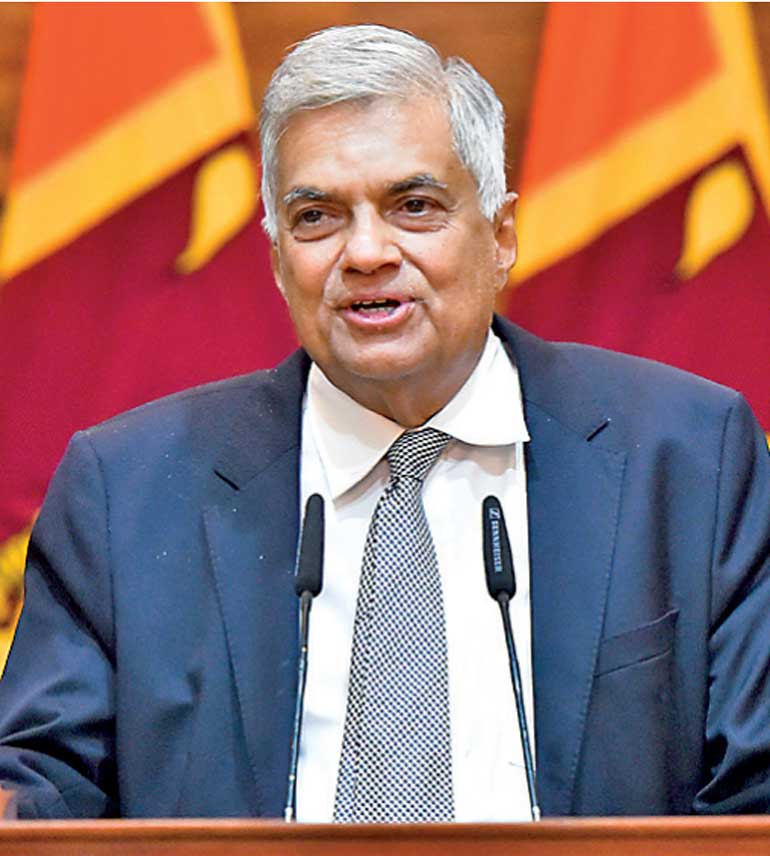Tuesday Feb 17, 2026
Tuesday Feb 17, 2026
Monday, 18 July 2022 00:00 - - {{hitsCtrl.values.hits}}

Acting President Ranil Wickremesinghe
 The Daily FT of Saturday 16 July condensed an epic political story into a single expressive headline – “RW takes Presidential Baton from Gotabaya.”
The Daily FT of Saturday 16 July condensed an epic political story into a single expressive headline – “RW takes Presidential Baton from Gotabaya.”
RW got his baton from GR. Some actions are immoral, but perfectly legal. There are yet other measures that may be illegal, but not necessarily immoral.
The ‘Aragalaya’ that demonstrated the power of the powerless falls in to the second category.
The German Philosopher Friedrich Nietzsche in his collection of notes later published under the title “Will to Power” took up this conundrum of truth and legality head on.
“All things are subject to interpretation whichever interpretation prevails at a given time is a function of power and not truth”.
It is all about power.
Ranil Wickremesinghe is the acting president of the republic. Constitutional propriety has been observed.
Nietzsche in his “Will to Power” describes the quest for power as an irrational force found in all of mankind that could be channelled to different ends. With wicked detachment he qualifies the search for power as a perverse but natural trait in the human animal.
The point of departure of this essay is to make sense out of this insanely immoral yet scrupulously legitimate constitutional demarche.
This writer is no adherent or enthusiast of Ranil Wickremesinghe. When he took on the job offered to him by an unnerved despot, I described it as a dalliance with political evil.
Now, the Federation of University Teachers has demanded that the acting President should not only step down but also withdraw from the contest.
It is an anguished appeal for moral integrity. It will not resonate with the moral ambiguity of the arch realist. Too much faith is a mean companion to live with. The land confronts an economic crisis that defies description. Should we waste valuable seconds in a senseless discussion?
As Nietzsche explains truth is not simple. We waste a lot of time establishing our version of truth and convincing the rest of the world that we are right, and the other side is wrong. As we shall discover in the proceedings in Parliament in the next few days, there is no single truth in this business called politics.
There’s no truth that all 225 members of parliament can accept because everything is subject to interpretation as pointed out in the quote with which I began this missive. For constitutional reforms we need a two-thirds majority. For drastic economic reforms we need near unanimity. That is the only avenue available to reach relief in dark times.
Besides all that, what’s the purpose of wasting time trying to convince those who are still in the grip of Basil’s bamboozle?
It is time that we too adopt Ranil Wickremesinghe’s cynical pragmatism.
Politics is not a precise science. In politics there is no way we can define truth. Most of the current anthropoids have voted for the 17th Amendment, 18th Amendment, the 19th Amendment, and the 20th Amendment. It is a talk shop that has no moral compass.
Since Mahinda Rajapaksa claimed that he defeated separatists and forged a single nation that had no minorities but only patriots I knew in my bones, that things weren’t right. I think most of my generation knew long before, that this crisis would come.
The Executive Presidency we have since 1978 produced evil that wasn’t in this land before. I have experienced the personal wrath of one executive president. The irony is that once I was quite close to him. Then carnations became an issue and separation was exquisitely disastrous for me.
We are human. Human reason can excuse all or most evil. So, we mustn’t rely too often or too much on our capacity to avoid evil. More often we seem to reconcile with evil because it is the commonsense thing to do. I am sure many would disagree with me. But I will say it. Under Rajapaksa rule in post-war Sri Lanka, to amend Hannah Arendt’s brilliant phrase Evil turned predictable and common place.
Aleksandar Solzhenitsyn in his novel ‘The Gulag Archipelago’ tells us about evil that resides in all of us. “If only it was all so simple! If only there were evil people somewhere insidiously committing evil deeds, and it were necessary only to separate them from the rest of us and destroy them. But the line dividing good and evil cuts through the heart of every human being. And who is willing to destroy a piece of his own heart?”
In this backdrop let us reappraise Mr. Acting President Ranil Wickremesinghe.
Why did Ranil Wickremesinghe do what he did? There is a pithy remark that is often attributed to Napoleon Bonaparte. “Power is my mistress. I have worked too hard at her conquest to allow anyone to take her away from me.” People who have spent a lifetime in the pursuit of powerful positions and held them as dear entitlements will always want to keep them.
When Ranil Wickremesinghe accepted the task, he did not lay down conditions to the beleaguered president Gotabaya Rajapaksa. He knew that no matter how many flowers were cut, spring would come.
Sajith Premadasa put conditions because he wished to express solidarity with the ‘Aragalaya’. Sajith was mindful of the future.
Sajith was planning the future. Ranil acted here and now.
Ranil did not put conditions because he is the consummate Orwellian. The object of power is power. Like most post-colonial societies, we have an elite class that either controls or has ready access to political and economic power. The ‘Aragalaya’ was a determined breakout from the clutch of these dinosaurs of a vanishing world. It will take time. Since my grand children relate to me more than to their parents I know.
This elite class is an organised minority. They still possess the means to badger, bully and coerce the majority which is yet in the process of getting organised.
Ranil Wickremesinghe was born into this elite class. The maternal grandfather was the press baron who had a near monopoly of the print media. His paternal grandfather was a Mandarin in the Colonial Civil Service. His father who hid a razor-sharp mind behind a charmingly cheerful persona was the bosom friend and advisor of President J.R. Jayewardene.
For his loyalty during his wilderness years JRJ made his son a junior minister. Early in politics Ranil Wickremesinghe was more equal than his peers.
Moving chess pieces behind the curtain is a privilege he has enjoyed since entering politics. A Faustian bargain has made him acting president. He may well get the prize.
Politics need not be a zero-sum game.
The 21st Amendment already vetted by the Supreme Court abolishes the executive presidency. All Opposition parties have endorsed the proposed 21st Amendment moved by the general secretary of the SJB.
It must be approved in a referendum. Parliament can pass it now and hold the referendum with the next general election that most demand at the earliest.
The acting president has said that necessary steps are being taken to restore the 19th Amendment. It narrows the chasm. Politics is not the art of hara-kiri.
The legend of Faustus – man selling his soul to the devil has a particularly fascinating appeal at this hour of economic peril and moral drift. This is a humble appeal to all those who disapprove of Ranil Wickremesinghe’s politics. Instead of unconditional confrontation, a united opposition should ask “what good will it be for a man if he gains the whole world, yet forfeits his soul?”
Sooner than later a compromise must be arrived at. Should we be human animals or just plain humans? There is great merit in coming to terms with disagreeable reality. These dark times need moral imagination.